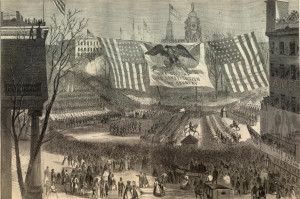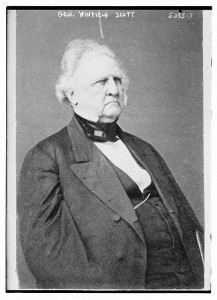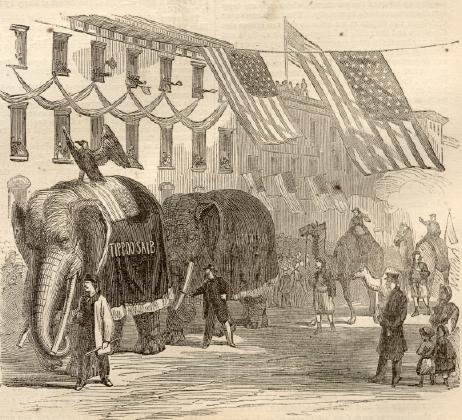On the same day that a Richmond publication admonished its readers to make an upcoming day of prayer and fasting truly earnest and solemn, the Empire City held a grand Union Jubilee, a seven mile long parade. General Winfield Scott could not attend but expressed his hope that the country could be reconciled.
Here are a couple excerpts from a very long article in The New-York Times March 7, 1865:
THE UNION JUBILEE.; Honors to Our Soldiers and Sailors. Gratitude of the People for National Victories. NEW-YORK IN GALA DRESS. An Imposing Procession Seven Miles in Length. Military, Industrial, and Civic Elements of the Pageant. Brilliant and Picturesque Parade of the Firemen. The Streets Thronged with Enthusiastic Spectators. SPLENDID DISPLAY OF THE NATIONAL COLORS. The Voice of the People at Union Square. Illuminations and Fireworks Throughout the City. a GREAT AND HAPPY DAY. …
As if to make up in full for Saturday’s inhospitable weather, yesterday was an absolutely perfect day for a great rejoicing. The rain had done much to clear the streets, and the civic carts and brooms had labored efficiently, too. And the sunshine and breezes that followed brought the ground beneath and heavens above to a capital condition for travel.
The delay had, moreover, given time for revisions and adjustments, which brought all the preliminaries of the procession to an excellent state of organization. And last, but not least, the news of SHERIDAN’s victory over EARLY put sunshine into every bosom, in complete harmony with the bright sky and bracing air.
Under such auspices the splendid and gigantic ceremonial of yesterday passed off with an unbroken unity, in character and effect hardly to be paralleled in scenic history.
THE WHOLE
of the vast pageant extended nearly seven miles, and was in motion during about six hours. Yet a view such as a balloon would afford, would have enabled a spectator to see the whole in motion at once for even a moment; for while the two great elephants and the two camels which brought up the rear, were still on Sixth-avenue, where they were drawn up, the head of the column had absolutely passed around the whole of its great circuit, and the infantry and cavalry of the leading regiments were being dismissed to their armories. …
Next, in barouches, ride some famous men. Lieut.-Gen. WINFIELD SCOTT was invited to be first of these, but was prevented by the infirmities of his honored age. What a long and varied multitude of memories would have accompanied the old hero, could he have ridden here among the soldiers of to-day! The scenes of the war of 1812, fought against the pipe-clayed British Grenadier, armed with “Brown Bess;” the tropical pictures of the Mexican war, where the real guerilla, and the lancers, with their fluttering flags, were his unaccustomed foes; and last, in contrast both sad and glorious, around him the heroes of the present strife of brother giants. The aged Commander declined to be present on this occasion in the following note:
NEW-YORK, March 3.
Hon. C.P. Daly, Cdairman, &c.:
DEAR SIR: I regret, on account of debility, I cannot take part in the grand celebration of to-morrow, as I sincerely rejoice in our victories over rebels, which, with others impending, cannot fail soon to bring back into the Union, on terms of perfect equality in rights and duties, the outstanding States. Reciprocal respect and admiration have already, by the dint of hard fighting, been established between the gallant veterans of the opposing armies, and this noble sentiment gives the hope that it may conquer the miserable hatred so general between non-combatants — Secessionists and Unionists. This, indeed, would be the great conquest of the day. I remain, with high respect, yours truly.
WINFIELD SCOTT. …
The images of the “victory” parade were published in the March 25, 1865 issue of Harper’s Weekly at Son of the South, where you can read more about “the people’s festival” and see more images.




